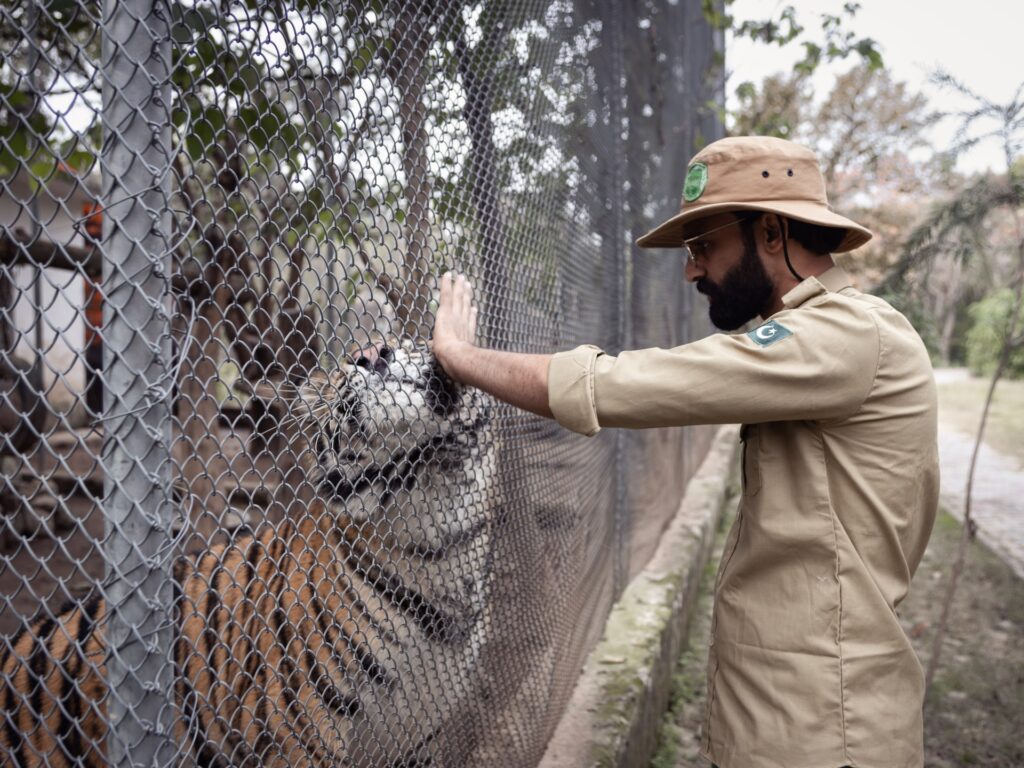Islamabad, Pakistan – From the outside, the former grounds of Marghazar Zoo may seem deserted. A dilapidated ticket office and overgrown foliage suggest an absence of tourists. But if you listen closely, you might hear the chatter of monkeys, the growls of bears, and even the roar of tigers.
The Islamabad High Court ordered Marghazar Zoo to close in 2020 following local and global outcry over the treatment of animals. After the animals were relocated, the Islamabad High Court ordered that the zoo grounds be handed over to the Islamabad Wildlife Management Board (IWMB), the government agency responsible for protecting wildlife in Islamabad and the adjoining Margalla Hills National Park. .
Pakistan is a country rich in biodiversity and home to several endangered species that are threatened by illegal hunting, poaching and habitat loss. Faced with daily reports of injured and trafficked wild animals, IWMB worked with local animal rights activists and the conservation nonprofit Second Chance Wildlife to gradually transform the former zoo grounds into protected areas. It began to be used as an animal rehabilitation center.
Since 2020, Margalla Wildlife Conservation Center has rescued more than 380 animals, including a rhesus macaque, an Asian black bear, an Indian pangolin, several species of birds, and a three-month-old Bengal tiger. The center not only receives reports of injured animals, but also leads raids to rescue animals it hears about criminal activity.
Some of these animals have been rescued from poachers. Some animals, such as bears, were used for entertainment, made to “dance” for entertainment, and even fought.
Babu, a young tiger, was in critical condition when he was rescued. “When we found him, he was so weak that he could barely walk,” says IWMB ranger Anees Hussain. An early separation from his mother left him malnourished and suffered multiple fractures.
For 14 months after his rescue, a small team of center staff and volunteers nursed Babu back to health. “Initially, we weren't sure if he would make it,” said Dr. Usman Khan, one of the veterinary consultants responsible for the young tiger's care. “Thanks to the daily care and treatment.” [at the centre] that he has fully recovered. ”
However, as Babu grew, it became increasingly clear that he needed more space and the company of other tigers, something the center could not provide. On February 14, after a long management and fundraising process, Babu was successfully relocated to the Isindile Big Cat and Predator Sanctuary in South Africa.
IWMB plans to establish a sanctuary to permanently house animals that cannot be released into their natural habitat. However, the center's survival is not without obstacles. Fundraising is a constant challenge as the center relies heavily on donations from civil society to cover the increasing costs of maintaining the facility and caring for the animals. “We're currently operating on a subsistence budget from one week to the next,” said Leah Boyer, co-founder of Second Chance Wildlife.
Not everyone supports the center's mission. The Metropolitan Development Authority, the city authority responsible for providing municipal services and previously managing the zoo, has repeatedly attempted to reopen the old zoo by reclaiming land and parts of the Margalla Hills National Park. However, IWMB said the ruling did not challenge the High Court's ruling and was unlikely to succeed.
“I just don't understand why we have to go back and open another zoo in Islamabad again,” says IWMB chairman Rina Saeed Khan. “[We] We value care over cruelty and our goal is to try to save as many endangered and vulnerable wildlife species in Pakistan as possible. ”
The team hopes to continue building the center's capacity to rehabilitate wildlife, including big cats. For example, leopards are endemic to the region, and human-leopard conflicts are not uncommon.
A few days after Babu's relocation, staff are preparing Babu's old enclosure for the two new arrivals.
Two baby leopards, Sultan and Neil, look up wide-eyed as Hussain gently pulls the animal out of its carrying case.
“Their mother just passed away,” he said, stroking the thick fur on Neal's neck. “I think they’ll be with us for a while.”

